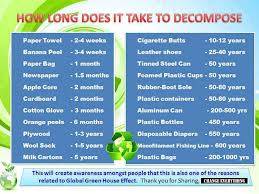Non-biodegradable waste is any material that cannot be broken down to 'base compounds'. If the waste was biodegradable, it could be broken down by elements such as air, water, soil or micro-organisms, over a long period of time.
A non-biodegradable waste product would be an item that contains glass or plastic. For example research has shown that a glass bottle can take up to 500 years to completely decompose and a plastic bottle about 450 years!
Here are some examples of non-biodegradable waste:
- Sweet wrappers
- Some plastic bags
- Cans
- Styrofoam
- Glass items
- Plastic toys
- Metal scraps
Although these items may not be able to break down, they can be recycled, which enables them to become useful once more. So instead of just throwing them away where they will go and fill up a land fill site, make sure you take them to a recycling centre.
These products have been created as technology has become more advanced, as we can now produce items that are stronger and can withstand more things.
